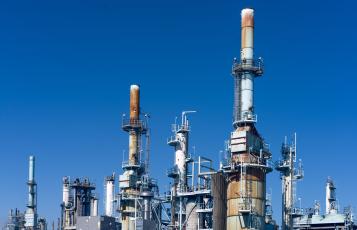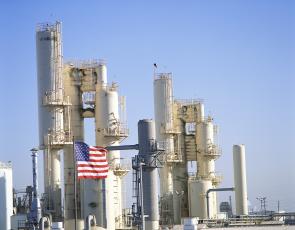Refining and petrochemical industries: Leading the way in safety among U.S. manufacturers
Nothing is more important to the refining and petrochemical industries than safety. AFPM’s member companies have strong safety records and consistently work to improve performance to take care of our people, communities and environment.
Technologies that help us reduce emissions
Refiners and petrochemical manufacturers are proving that using oil and gas while reducing emissions is not a zero-sum game. By integrating cutting-edge technologies and developing lower emissions products, they are enabling global communities to enjoy the benefits of life-enhancing fuels and petrochemicals, all while significantly lowering emissions across the economy. This transformative approach is paving the way for a future where energy efficiency and environmental stewardship go hand in hand.
Products that reduce emissions
While AFPM members continue to produce the traditional fuels and energy essential for our daily lives, they are also at the forefront of creating liquid fuels with lower lifecycle greenhouse gas (GHG) emissions to reduce emissions throughout the transportation sector.
New ad, “Don’t California our cars,” urges Congress to overturn EPA authorization of CA gas car ban
WASHINGTON, D.C. — The American Fuel & Petrochemical Manufacturers (AFPM) is out with a new ad—Don’t California our cars—urging Congress to overturn EPA’s 2024 rule authorizing California’s ban on sales of new gas, diesel and traditional hybrid vehicles.
What is downstream?
The downstream segment encompasses refineries and petrochemical manufacturing facilities that process crude oil and natural gas liquids into finished products. There are 131 operable refineries in the United States that manufacture essential energy products, including gasoline, diesel and jet fuel.
What is midstream?
The midstream segment moves and stores feedstocks and finished products — including fuels, natural gas, natural gas liquids and petrochemical products — using an integrated system of pipelines, ports and waterways, railroads, roadways and storage facilities.
What is upstream?
Members of the upstream segment explore for and extract crude oil, natural gas and natural gas liquids (NGLs). Crude oil and NGLs are used as feedstocks to produce fuels and petrochemicals, and in some cases directly as sources of energy and natural gas is used as a source of energy.
AFPM statement on latest tariff announcement
WASHINGTON, D.C. — American Fuel & Petrochemical Manufacturers (AFPM) President and CEO Chet Thompson issued the following statement in response to Wednesday’s tariff announcement from the Trump administration.
100+ energy, ag & transportation groups urge Congress to reverse CA vehicle ban
WASHINGTON, D.C. — The American Fuel & Petrochemical Manufacturers (AFPM) today joined 110 other stakeholders across energy, agricultural and transportation supply chains urging Congressional leadership to use the Congressional Review Act (CRA) to protect American consumers and reverse California’s harmful vehicle mandates, including its expansive ban on sales of new gas, diesel and traditional hybrid cars and trucks over the next decade.









